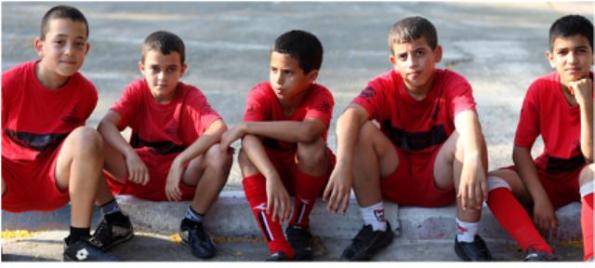Football, they say, speaks a universal language. This language could be that of the histrionics and bad behavior of the over-paid, over-pampered superstars of the game; or it could be something more meaningful, more affecting, demonstrating how football can bridge communities, how a shared love of the “beautiful game” can remind us of how much we have in common, rather than how much separates us as human beings.
The Soccer Lesson, a series of five short documentaries recently screened at the International Children’s Film Festival in Tel Aviv, takes the latter approach. 50 minutes long, the film was made as a project for young filmmakers sponsored by Mifal Ha Pais – The National Lottery – and the Keshet Broadcasting Network. The documentarians – with the guidance of experienced directors and documentarians Tomer Heymann, Eyal Halfon, Ido Haar and the late Juliano Mer Hamis – took their cameras around the country, meeting and documenting young soccer players from Mifalot Hinuch, the nationwide program which uses football as a conduit for social integration and community development.
Different in their own individual ways, what unifies the shorts is a genuine, unaffected interest in the lives of their subjects; and the fact that as they explore the everyday experiences of their subjects, one can sense that the filmmakers learn a little about themselves at the same time.
We meet Tigist, a 12 year old immigrant from Ethiopia living in Beer Sheva. As the cameras follow her and her group of young religious girls around the pitch, some small boys – perhaps envious of the attention – jump up and down, trying to deflect attention away from the girls and to themselves. Later, Tiglis talks haltingly, yet affectingly about life in Israel. She is sad that she made Aliyah, she says; life was happier in Ethiopia. One of the filmmakers – of Russian origin, from south Tel Aviv, and no stranger to prejudice herself – muses: “How do small children know the word ‘racism’?” It’s a good question.
Yosefi, with Down’s Syndrome is the goalkeeper for the Hapoel Ramla Sinai. “Fair play is the most important thing,” their coach remind the team before an important game. They lose; Yosefi lets in a soft goal. As he undresses after the film, apparently disconsolate, one is tempted to feel pity for him. But he picks himself up and goes along his way, head held high. Yosefi doesn’t need pity; he needs understanding, which is something else altogether.
The characters at the centre of all the films live straitened lives – bombs in Sderot, disability, social exclusion or negotiating the delicate balance of Arab-Jewish relations in Lod. But ultimately, the films are more interested in optimism, looking for the path to a better tomorrow. There’s a poignant moment in one of the shorts, an elderly woman walking along the street coming across a battered old football. She picks it up almost tenderly. The camera pans to a mural on a nearby wall, with the single word “Hope”.






